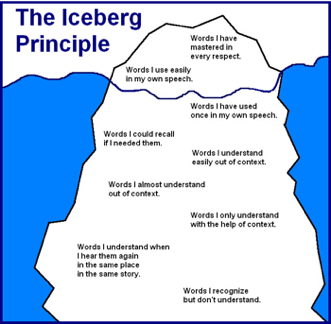[Note: This is my own summary of the Iceberg Principle in GPA, adapted from the GPA P1 Manual].
The Iceberg Principle in GPA is a very different way of thinking about learning vocabulary and grammar compared to traditional textbook approaches. Here’s here the GPA manual describes it:
Part of the philosophy of growing participation (GPA) is to place a high priority on learning to understand speech. Listening to people with understanding is primarily a matter of giving, whereas talking to people and trying to be understood is more prone to be a matter of taking!
One of the biggest factors in understanding speech is understanding thousands and thousands of words. One way to learn a large number of words is to apply what GPA calls the Iceberg Principle. This principle has two parts:
1. Pay really good attention to new words when first encountering them (have a “strong encounter”).
2. Keep re-encountering them in new contexts (listen lots!)
— Greg & Angela Thompson, GPA Phase 1 Manual, pp. 13-14.
Now, let’s break it down. What’s the theory behind this?
We all have a language iceberg

Psychologists and linguists refer to the store of words in our brain as the mental lexicon or dictionary. This dictionary in our brain is like an iceberg. Some words are very strongly “written” in the mental lexicon, and some are barely there. The strong words are at the top of the iceberg. We have mastered them, and can use them at will. The weak words are at the bottom of the iceberg. We have learnt them, and can recognize them in context if we hear them. But we haven’t yet mastered them.
Pushing new words into the tip of your iceberg is hard work
Language teachers and students often try to learn new words by mastering them at once. We say they are trying to put the word into the “tip of the iceberg”. This is the traditional approach to language learning. People put great energy into attempting to master every word when they first encounter it. Firstly, this takes a lot of a time and energy, which makes learning new words slow. Secondly, people often find that a large portion of the words they tried to master do not stay mastered!
Putting new words into the bottom of your iceberg is easy
For the same effort it takes to put a few words into the tip of the iceberg, we can put many words into the lower part of the iceberg. Once you have had a strong learning experience with a new word, we say it is in the bottom of your language iceberg. If asked to translate on the spot, you probably won’t be able to recall the word. But if you hear someone using the word in a sentence you understand, with context, you will recall it. That word is in your brain, even if you haven’t mastered it, and even if you don’t fully understand it’s range of meaning and grammatical usage.
Words naturally rise in your iceberg if you keep hearing them
This is where the magic of this approach comes in. Words naturally rise in the iceberg as we keep hearing and understanding them in other contexts, spoken by more speakers. After enough encounters, they are in the tip of the iceberg, meaning that we can use them in our own speech in a reasonably natural way – with much less conscious effort! Now, this only works if you continue to listen to lots of speech in the language you’re learning on a regular basis. So in GPA the focus is listening to hundreds and hundreds of hours of understandable speech.
Therefore, GPA focuses on pushing thousands of words into the bottom of the language iceberg, and making sure we continually encounter those words again and again, by doing lots of listening.
But what if I can’t remember?
Some people find it difficult to accept the Iceberg Principle in GPA, especially early on. Rather than saying, “I have had many strong encounters with new words, and they are in my iceberg and rising higher because I am re-encountering them,” they say, “I’m not learning anything!”.
This indicates that their goal is to master new words to the point of being able to readily recall them for use in speaking. Thus they become discouraged and frustrated.
What’s needed is a change in perspective: our first concern is to understand people, not to talk to them. That’s important too, but there will be many opportunities as you progress through GPA to move words up the iceberg.
Following GPA means that the number of words one can understand can and should grow more quickly than the number of words one can recall and use in speaking. And that’s OK.